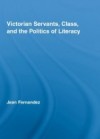
Areas of Interest: Victorian Fiction and Autobiography, Empire Studies, Narratology, Women’s Writing, and Literary Theory
Contact Information
Email: jfernand@umbc.edu
Office: PAHB 410
Office Number: 410-455-2166
Biography
Jean Fernandez, Professor of English, received her PhD from the University of Iowa, where she was a Seashore Dissertation Fellow and a Freda Dixon Malone scholar.
Her work has appeared, or is scheduled to appear, in LIT: Literature Interpretation Theory, Victorian Poetry, Victorian Literature and Culture, New Hibernia Review, The Blackwell Encyclopedia of Victorian Literature, Victorian Review, The Gaskell Journal, Nineteenth Century Gender Studies, and The Palgrave Encyclopedia of Victorian Women’s Writing.
Books
 Geography and the Literary Imagination in Victorian Fictions of Empire: The Poetics of Imperial Space
Geography and the Literary Imagination in Victorian Fictions of Empire: The Poetics of Imperial Space
Routledge, 2020
In this pioneering study, Dr. Fernandez explores how the rise of institutional geography in Victorian England impacted imperial fiction’s emergence as a genre characterized by a preoccupation with space and place. This volume argues that the alliance between institutional geography and the British empire which commenced with the founding of the Royal Geographical Society in 1830, shaped the spatial imagination of Victorians, with profound consequences for the novel of empire. Geography and the Literary Imagination in Victorian Fictions of Empire examines Presidential Addresses and reports of the Royal Geographical Society, and demonstrates how geographical studies by explorers, cartographers, ethnologists, medical topographers, administrators, and missionaries published by the RGS, local geographical societies, or the colonial state, acquired relevance for Victorian fiction’s response to the British Empire. Through a series of illuminating readings of literary works by R.L. Stevenson, Olive Schreiner, Flora Annie Steel, Winwood Reade, Joseph Conrad, and Rudyard Kipling, the study demonstrates how nineteenth-century fiction, published between 1870 and 1901, reflected and interrogated geographical discourses of the time. The study makes the case for the significance of physical and human geography for literary studies, and the unique historical and aesthetic insights gained through this approach.
 Victorian Servants, Class, and the Politics of Literacy
Victorian Servants, Class, and the Politics of Literacy
Routledge, 2009
In this volume, Fernandez brings the under-examined figure of the Victorian servant out of obscurity in order to tell the story of his or her encounter with literacy, as imagined and represented in nineteenth-century fiction, autobiography, pamphlets and diaries. The study reads canonical fiction by Mary Wollstonecraft, Emily Bronte, Elizabeth Gaskell, Wilkie Collins, and R.L. Stevenson alongside popular detective fiction by Catherine Crowe, the diaries of Hannah Cullwick, and best-selling pamphlets of the age.